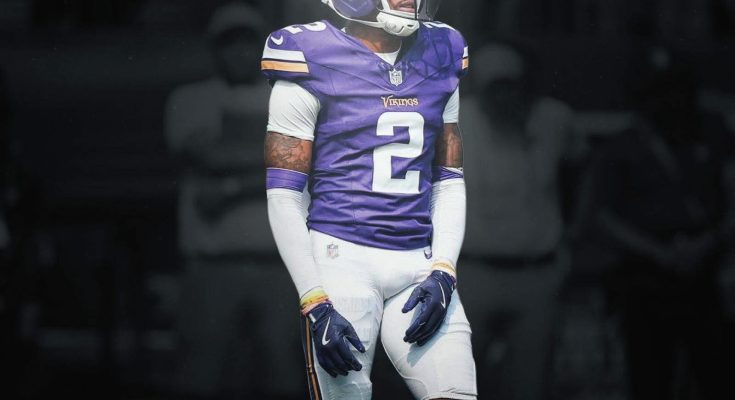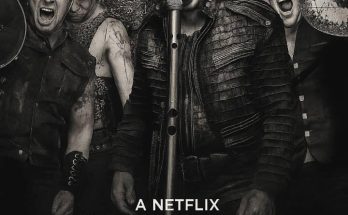The Minnesota Vikings cornerback Isaiah Rodgers found himself confronting an ugly side of the game that goes far beyond touchdowns and tackles. After Sunday’s loss to the Philadelphia Eagles, Rodgers shared screenshots of racist messages he received from an individual posing as a fan. It was a sobering reminder that, despite the progress society claims to have made, racism continues to lurk beneath the surface of professional sports. Rodgers, visibly disappointed but not surprised, took to social media platform X to expose the hate messages publicly. “Racism is real keep football, football. That’s not even the worst I’ve seen. Stay solid or stay silent. Pick a side and stay on it,” he wrote, mixing a touch of irony with resolve. His post wasn’t just about calling out a single offender; it was a broader statement about the persistent undercurrent of racism that many athletes of color still endure.
The Vikings organization swiftly responded, issuing a strong statement condemning the racial abuse aimed at Rodgers. “We are disgusted by the racial slurs directed at Isaiah Rodgers following yesterday’s game,” the statement read. “As we have said previously, there simply is no room for racist words or actions in sports or society. We support Isaiah and all players who, unfortunately, experience this type of ignorant and prejudicial behavior far too often, and we ask our fans to continue to fight to eliminate racism.” The franchise’s statement was measured, sincere, and deeply necessary. It reaffirmed a commitment to inclusivity and respect, something every professional sports organization must continually reinforce as part of its public identity and internal culture.
For Rodgers, the ordeal was deeply personal. The cornerback, who has fought his way into the league through perseverance and skill, should have been discussing game film, route coverage, and defensive adjustments — not racial slurs. Yet here he was, once again forced to address something that has nothing to do with his performance on the field. The messages he shared showed a disturbing truth: even in 2025, professional athletes, especially Black players, remain targets of racial hostility from some members of the public. These messages often emerge in the emotional aftermath of games, when frustrations boil over and some fans feel entitled to dehumanize players behind the anonymity of a keyboard.
Rodgers’ decision to expose the messages rather than ignore them carried weight. By publicly sharing what he received, he stripped away the comfort of silence that often shields such offenders. Many athletes in recent years have taken similar steps, recognizing that ignoring racism only perpetuates its presence. Whether it’s through social media exposure or official complaints to leagues and teams, these moments spark necessary conversations about accountability and cultural awareness. Rodgers’ response — firm, reflective, and unshaken — symbolized both resilience and exhaustion. He laughed off the hate in his post, but the undertone was clear: he’s tired of having to deal with this at all.
The incident sparked waves of support from teammates, fans, and fellow athletes across the NFL. Players like Rodgers often become unwilling symbols in a broader social struggle, their experiences mirroring the everyday realities of millions who endure racism in quieter settings. Many of his teammates reposted his message, adding their own condemnations of the hate he received. Behind closed doors, sources within the team said coaches and players reached out personally to Rodgers, reinforcing unity within the locker room. The Vikings have long prided themselves on being a diverse and inclusive organization, and this moment tested that commitment. The team’s swift and unequivocal stance demonstrated solidarity, not just with Rodgers, but with every player of color who has faced similar vitriol.
Social media exploded with reactions. Some fans expressed outrage that such behavior still existed in the league’s fan base, while others offered empathy and support to Rodgers. Unfortunately, there were also a few who downplayed the significance of the incident or attempted to rationalize the hate as mere frustration after a loss — a telling reflection of the broader societal divide surrounding issues of racism in sports. Yet the overwhelming majority condemned the racist messages and rallied behind Rodgers, reaffirming that compassion and humanity outweigh ignorance and hate.
This is far from an isolated incident. Over the years, countless athletes across different sports have faced similar racial abuse — often after losses, mistakes, or even moments of triumph that certain individuals interpret through a racist lens. From soccer players in Europe being targeted with monkey emojis and slurs, to basketball players in the NBA receiving hate-filled direct messages, to NFL athletes being attacked for kneeling during the national anthem, racism in sports remains a recurring issue. The digital age has only amplified it, allowing offenders to spew hate from behind the safety of anonymity. Platforms like X, Instagram, and Facebook have taken steps to moderate such content, but the problem persists, highlighting the limitations of technology when confronting deeply ingrained prejudice.
What makes Rodgers’ case particularly painful is that he had just finished doing his job. He went out, competed, and represented his team — and for that, he was met not with analysis of his play, but with racial hate. It illustrates a deeper issue about how some fans view Black athletes: celebrated for their talent when things go right, but dehumanized the moment emotions turn sour. This duality — the simultaneous worship and degradation of athletes of color — reflects a hypocrisy that sports organizations and fans alike must reckon with. Rodgers’ experience forces that conversation into the open, uncomfortable though it may be.
The Vikings’ statement also underscores a critical reality: teams can issue words of condemnation, but lasting change depends on continued action. Education programs, community initiatives, and stronger reporting systems for online abuse are essential. The NFL itself has emphasized inclusion and equality through various campaigns, such as “It Takes All of Us” and “Inspire Change.” Yet moments like this remind everyone that slogans alone cannot eradicate racism. The league and its franchises must remain vigilant, ensuring that players feel protected not only on the field but off it, too.
Rodgers’ own words — “Stay solid or stay silent. Pick a side and stay on it.” — resonate beyond sports. They challenge fans, organizations, and society at large to make a choice. It’s a call to consistency, a refusal to allow neutrality in the face of injustice. Staying silent only aids the problem, and Rodgers knows it. By using his platform, he reminds others that change requires confrontation, not avoidance. For many fans, especially younger ones who look up to him, that message will echo longer than any interception or defensive play.
The incident has also reignited conversations within the Vikings’ fan base about accountability and the importance of self-reflection. True fandom, many argued, involves supporting players as human beings first. Football, at its core, is about unity — a team working together toward a common goal. To attack a player because of his race is to betray the very spirit of the sport. Fans have power not only in cheering from the stands but also in shaping the culture surrounding the game. When they stand up against racism, they send a message that hate has no home in the Vikings community or anywhere else in the NFL.
In a broader sense, this episode shines a light on the persistence of racism in modern America. Sports have long been seen as a microcosm of society — a place where issues of race, identity, and equality are played out on a public stage. While the NFL and other leagues have made strides in promoting diversity and inclusion, these individual incidents show that the battle is far from over. For every banner, PSA, or community initiative, there are still those who cling to ignorance and prejudice. Rodgers’ experience is a reminder that progress is fragile, and vigilance must never waver.
Isaiah Rodgers’ courage in speaking out deserves recognition. It takes strength to expose such personal hate, to resist the instinct to ignore it, and to use the moment instead as a teaching opportunity. His words, mixed with resilience and frustration, serve as both warning and inspiration. He didn’t let the hatred define him, nor did he let it slide into silence. His message — “Racism is real” — may be simple, but its truth reverberates across the sport and society. In acknowledging that reality without bitterness, he commands respect and awareness.
The Vikings’ support adds an important layer to this story. When organizations stand behind their players in moments like these, they not only protect them but also reinforce the values of equality and respect. It shows young fans and future athletes that racism will not be tolerated, that unity will always be stronger than division. For the NFL, which has had its own complex history with racial issues, continuing to back players like Rodgers publicly and privately is a necessary step toward building a more just and compassionate league.
As the days pass, the story will fade from headlines, but the underlying issue will remain. Rodgers will return to practice, the Vikings will prepare for their next game, and fans will once again focus on football. Yet for Isaiah Rodgers, and for many players who share his experiences, the reminder lingers — a scar that represents both pain and perseverance. The challenge for fans, organizations, and society is to ensure that these moments are not forgotten or dismissed but used as fuel to drive change. The true victory won’t come from a touchdown or a defensive stand, but from creating a world where players like Rodgers can compete without ever having to confront racism again.
In the end, Rodgers’ post and the Vikings’ response stand as a joint declaration: racism has no place here. The fight continues — on the field, in locker rooms, in online spaces, and in every corner of society. Rodgers has played his part by shining a light on the darkness. Now, it’s up to the rest of us to keep that light burning, to ensure that no player, no person, ever has to face hate in silence again.


